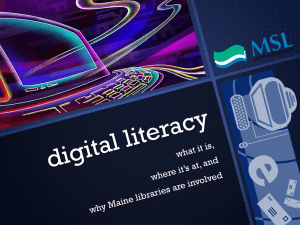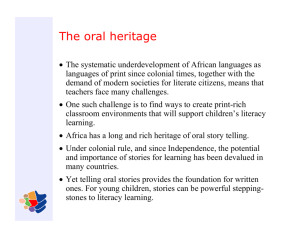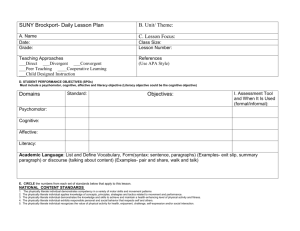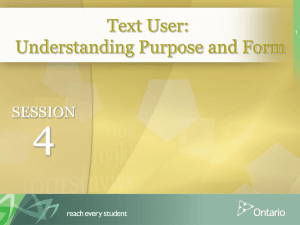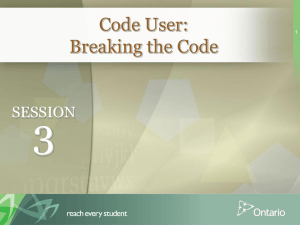The Case for Writing Studies as a Major Discipline
advertisement
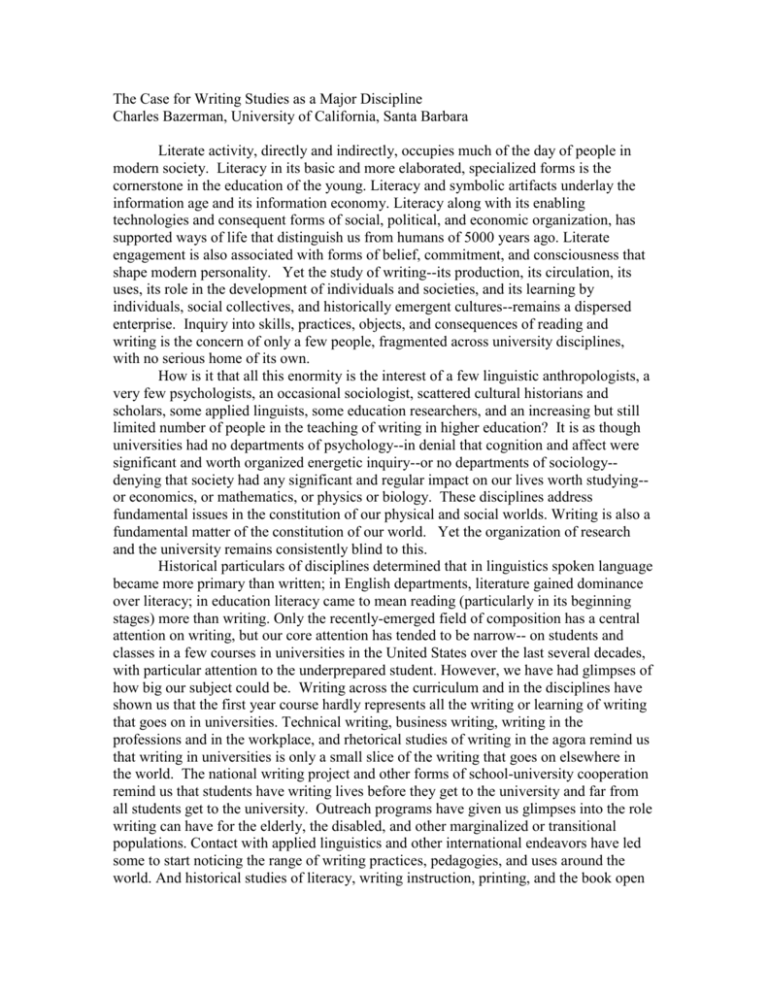
The Case for Writing Studies as a Major Discipline Charles Bazerman, University of California, Santa Barbara Literate activity, directly and indirectly, occupies much of the day of people in modern society. Literacy in its basic and more elaborated, specialized forms is the cornerstone in the education of the young. Literacy and symbolic artifacts underlay the information age and its information economy. Literacy along with its enabling technologies and consequent forms of social, political, and economic organization, has supported ways of life that distinguish us from humans of 5000 years ago. Literate engagement is also associated with forms of belief, commitment, and consciousness that shape modern personality. Yet the study of writing--its production, its circulation, its uses, its role in the development of individuals and societies, and its learning by individuals, social collectives, and historically emergent cultures--remains a dispersed enterprise. Inquiry into skills, practices, objects, and consequences of reading and writing is the concern of only a few people, fragmented across university disciplines, with no serious home of its own. How is it that all this enormity is the interest of a few linguistic anthropologists, a very few psychologists, an occasional sociologist, scattered cultural historians and scholars, some applied linguists, some education researchers, and an increasing but still limited number of people in the teaching of writing in higher education? It is as though universities had no departments of psychology--in denial that cognition and affect were significant and worth organized energetic inquiry--or no departments of sociology-denying that society had any significant and regular impact on our lives worth studying-or economics, or mathematics, or physics or biology. These disciplines address fundamental issues in the constitution of our physical and social worlds. Writing is also a fundamental matter of the constitution of our world. Yet the organization of research and the university remains consistently blind to this. Historical particulars of disciplines determined that in linguistics spoken language became more primary than written; in English departments, literature gained dominance over literacy; in education literacy came to mean reading (particularly in its beginning stages) more than writing. Only the recently-emerged field of composition has a central attention on writing, but our core attention has tended to be narrow-- on students and classes in a few courses in universities in the United States over the last several decades, with particular attention to the underprepared student. However, we have had glimpses of how big our subject could be. Writing across the curriculum and in the disciplines have shown us that the first year course hardly represents all the writing or learning of writing that goes on in universities. Technical writing, business writing, writing in the professions and in the workplace, and rhetorical studies of writing in the agora remind us that writing in universities is only a small slice of the writing that goes on elsewhere in the world. The national writing project and other forms of school-university cooperation remind us that students have writing lives before they get to the university and far from all students get to the university. Outreach programs have given us glimpses into the role writing can have for the elderly, the disabled, and other marginalized or transitional populations. Contact with applied linguistics and other international endeavors have led some to start noticing the range of writing practices, pedagogies, and uses around the world. And historical studies of literacy, writing instruction, printing, and the book open us to an appreciation of the particularity of our set of literate conditions, the many forces and events that our literate practices respond to, and the monumentality of the literate accomplishment. Of all disciplines, composition is best positioned to begin to put together the large, important, and multi-dimensional story of writing. We are the only profession that see writing as its center. The university, moreover,--as central to contemporary societyís knowledge, ambitions and professions; as the heir to many of the literate movements of history; and as an international meeting place of global projects--is as good a standpoint as any from which to view writing at this juncture in history. Yet we as a field must be willing to lift up our eyes to this larger charge. It is time for us to rise above the accidents of disciplinary history that have kept our truly significant subject only minimally visible and have blinded us to the enormity of the material we have taken to instruct our students in. It is time to recognize that writing provides some of the fundamental mechanisms that make our world work--and to assert that writing needs to be taken seriously along with the other major matters of inquiry supported by institutional structures. So what would be parts of such an inquiry? Fortunately we do not need to make this up out of whole cloth. Fragmented but numerous publications dispersed across disciplines such as anthropology, linguistics, history, classics, cultural studies, psychology, sociology, science studies, education, and composition suggest major outlines of the inquiry. Writing as a subject matter has such power that whan people begin inquiring into it, they immediately are drawn into stories of great importance and their studies become motivated and extensive--though not necessarily finding continuing institutional support to become continuing endeavors. The greatest energy, in both composition and education, has gone into studies of learning to write, whether through anecdotal descriptions of individual students, ethnographies of classrooms, or quantitative studies of the efficacy of various pedagogies. Many pedagogies have been tried and many students at all levels have been observed and documented through many methods, and the data have been analyzed through many theoretical and disciplinary lenses. From this we have learned about the trajectories and success of various paths of learning, in various circumstances, with various students, for various purposes. Because learning to write will remain a major imperative in education and society for the forseeable future, though forms and occasions of writing may shift rapidly with the introduction of information technologies, such studies must remain a major concern. Since writing is developed and supported throughout the life-span in every new occasion of writing for every new purpose--as any writer, no matter how experienced, is constantly reminded--we need to go further in extending our full range of studies from the earliest years onward, in school and out, as part of the continuum of learning that for a transient period alights in the university, but then moves out into the workplace and agora, and continues into the retirement years of reflection and renewed social engagement. There are now studies in all these areas, but they would gain by greater dialogue from an entire life-span perspective. The people who study emergent literacy in pre-school years have much to say to people who teach eighteen year olds as do people who study the writing of the socially powerful as well as the powerless. Also since our life spans of writing are now being supported through technology, we need to understand more fully the ways in which technologies are reshaping these writing experiences, how the technologies may provide new kinds of support and how people move through various supportive literate technologies throughout their lives. The lifespan perspective on writing development also leads us to take even more seriously the great variety of writing engagements that individuals address in schools and outside, for it is through the socially distributed and social organized forms of writing that people develop as writers and form their literate consciousness. Understanding that writing is deeply integrated with our development as individuals and social collectives necessitates that the study of writing be deeply embedded in psychology, sociology, political science and history, just as those fields need to attend to writing as deeply constitutive of their subjects of inquiry. Seeing writing within the complex of our unfolding lives also suggests that research in writing across the curriculum, writing in the professions, writing in the workplace, writing in the public sphere are far more than instrumental exercises in the conventions of getting things done. They are studies in how people come to take on the thought, practice, perspective and orientation of various ways of life, how they integrate or keep distinct those perspectives in which they are practiced, and how we organize our modern way of life economically, intellectually, socially, interpersonally, managerially, and politically, through the medium of texts. The particularity of our current literate arrangements is highlighted by comparative international, cultural, and historical studies that indicate how literate practice and its consequences vary. Historical studies also reveal the emergence of our current practices, with the underlying assumptions and choices embedded in our current forms, distribution, and uses of writing. Historical and comparative studies also reveal how the introduction of literacy or a change in literate practices reshapes the various spheres of human endeavor. In short, the study of writing is a major subset of the history of human consciousness, institutions, practice, and development over the last five millenia, and composition--the learning and teaching of writing--is in the middle of all that. It appears that composition is a serious intellectual endeavor. To give a bit of concrete substance to this broad intellectual charge for the study of writing, and to suggest how I came to see the field in such sweeping terms, let me locate my own work. In teaching writing to underprepared first year college students so that they could address the demands of their undergraduate career, I found myself focusing on how students could use, respond to, and criticize the materials they were reading in their classes. This issue of intertextuality led me to examine those intertextual fields of disciplines that undergraduates were engaging in, the ways in which they could engage with those fields, and what happened to them as they developed particular forms of engagement. Pedagogically these concerns led toward writing about reading and writing across the curriculum. In research they led toward a study of the discourses of the disciplines, in particular the sciences, focusing on the emergence of forms of experimental reporting. Theoretically, I turned to theories of genre as a social construct, intertextuality, and activity. But underneath these were a wider range of theoretical sources in language, sociology, and psychology that treat human language, personality, activity, and interrelations as historically emergent through the purposive actions of individuals within social fields. Several kinds of related syntheses have continually guided my work. The first is an emergent historical picture of writing practices, genres, systems of circulation, and related institutions and social systems. That is, in the same way as I saw the emergence of science related to its emergent forms and systems of written communication, so I began to see all aspects of the modern world in relation to the emergent infrastructure of written communications that shaped, regulated, and provided ongoing matters of attention. Although my studies seem to spread all over literate history--from early letters in the near east to political websites in recent elections and the rhetoric of political activism in the last half of the twentieth century--I see them simply as elaborating different spots on the same four dimensional map. My recent book The Languages of Edisonís Light, although overtly concerned with just the literate actions of a small group of individuals over a few years of the late nineteenth century in the New York area, places those written communications in the multiple worlds of unfolding literacy in this country and world wide over that century. This project gives a bit of the flavor of the larger historical synthesis I have strived for. A second synthesis is a theoretical one which has attempted to re-vision rhetoric from the perspective of writing and placed within some of the major strains of twentieth century social theory and social science. I have tried to integrate, from the point of of writing, Vygotskian and neo-Vygotskian theories built on a Marxist-Hegelian history of consciousness; utterance based linguistics of a Bakhtinian sort; phenomenological sociology emerging from Schutz; the American pragmatist tradition leading to symbolic interactionist, structural, and structurational sociologies, linguistic anthropology, and interpersonal psychiatry. All these theories point to an historically emergent sense of the human in social settings, mediated by communications. While theoretical issues float through a number of my earlier studies, and especially Shaping Written Knowledge, I more explicitly foregrounded theoretical issues in several essays in Constructing Experience, including ìWhose Moment: the Kairotics of Intersubjectivityî and a long introduction ìNotes toward a Literate Theory of Rhetoric.î Several essays on genre theory and activity theory have further helped articulate this synthesis. I am currently working on a multi-volumed rhetorical theory of literacy. The last kind of synthesis has been from the perspective of the individual--both as a writer and as a learner of writing. While this picture has been informed by my studies of the practices and development of several historically prominent scientists and rhetors-A. H. Compton, Isaac Newton, Otto von Guericke, Joseph Priestley, Adam Smith--this has been tied most closely to my own reflection on myself as a constantly (I hope) developing writer, on my students, and on my pedagogical practices. While this picture is very much about the craft and technical choices facing writers, it is deeply tied to writersí socialization into communal activities, the forms of engagement, positioning, and goals within those communal endeavors, and their emergent identities, commitments, and accomplishments as literate social beings. This synthesis guides my daily struggles with writing, and my daily practice as teacher and friend working with students or teachers of students from early childhood through graduate students and working professionals. The most public expression of this practical synthesis is in my textbooks such as The Informed Writer, The Informed Reader, and most recently Involved: Writing for College, Writing for Your Self. These three syntheses--the historical, the theoretical, and the practical--to me tell the same story, for the theory is an attempt to understand how we live our lives at the unfolding edge of history, using literacy in the ways that make most sense for us in our lives, to continually make a future from our own skills and choices as writers. While I have been pursuing these visions, trying to ground myself within the realities of historical evidence, the best wisdom of contemporary social science, my own experience, and the learning of my students, others interested in writing have been engaged in their own inquiries. Writing is powerful along many dimensions, various in its manifestations, and composed of many elements and processes. There is much that we can and ought to know, and I can hardly delude myself that the subject is exhausted by the work that is close to mine. We need a thousand flowers to bloom, but it would help if these plants got a bit more regularized support, if the harvesting were a bit more coordinated, and if the various cultivations were institutionally recognized as part of a significant cooperative endeavor. Perhaps the study of writing is just too interesting and too much fun to be called a serious endeavor, but I sure think it would be a great idea if our own field and the organization of the university and research took it more seriously. Related publications by the author Historical ìNuclear Information: One Rhetorical Moment in the Construction of the Information Age.î Written Communication forthcoming. ìPolitically Wired: The Changing Places of Political Participation in the Age of the Internet.î IT and Organizational Transformation. Ed. J. Yates and J. Van Maanen. Sage, forthcoming. ìLetters and the Social Grounding of Differentiated Genres.î Letter Writing as a Social Practice. Barton, D. & N. Hall (eds.)Amsterdam: John Benjamins, 2000. The Languages of Edisonís Light. MIT Press, 1999. "Money Talks: The Rhetorical Project of Adam Smith's Wealth of Nations." Economics and Language, Willie Henderson et al, eds. New York: Routledge, 1993: pp. 173-199. "How Natural Philosophers can Cooperate: The Rhetorical Technology of Coordinated Research in Joseph Priestley's History and Present State of Electricity." Textual Dynamics of the Professions. University of Wisconsin Press, 1991. Shaping Written Knowledge: The Genre and Activity of the Experimental Article in Science. Madison: University of Wisconsin Press, 1988. Theoretical ìA Rhetoric for Literate Society: The tension between expanding practices and restricted theories. Inventing a Discipline, Rhetoric and Composition in Action.î Inventing a Discipline. ed. M. Goggin. NCTE, forthcoming. ìSingular Utterances: Realizing Local Activities through Typified Forms in Typified Circumstances.î Analysing the Discourses of Professional Genres. ed. Anna Trosberg. Benjamins, 2000. ìLooking at Writing; Writing What I See.î Living Rhetoric and Composition. ed. Theresa Enos and Duane Roen. Mahwah NJ: Erlbaum, 1998. pp. 15-24. ìDiscursively Structured Activities.î Mind, Culture and Activity 4:4 (1997): 296-308. Constructing Experience. Southern Illinois University Press, 1994. ìSystems of Genre and the Enactment of Social Intentionsî Rethinking Genre. Ed. A. Freedman and P. Medway. Taylor & Francis, 1994. Practical Involved: Writing for College, Writing for Your Self. Houghton Mifflin, 1997. "From Cultural Criticism to Disciplinary Participation: Living with Powerful Words." Writing, Teaching, and Learning in the Disciplines, ed. Moran and Herrington. Modern Language Association, 1992, pp. 61-68. The Informed Reader: Contemporary Issues in the Disciplines. Boston: Houghton Mifflin, 1989. The Informed Writer: Using Sources in the Disciplines. Boston: Houghton Mifflin, 1981; 1985; 1989; 1992; 1995. "A Relationship Between Reading and Writing: The Conversational Model." College English 41:6, 1980, pp. 656-661.


